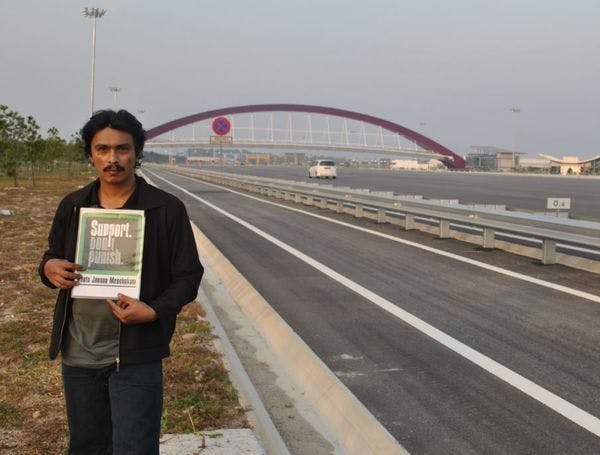Support people who use drugs in Malaysia - Join Support. Don’t Punish. on 26 June 2014!
I met Apit for the first time when I visited Penang, Malaysia, in December. He is the President of the Malaysian Welfare Association of Recovering Drug Users (WARDU), which was set up to provide care services for people who use drugs after the Malaysian Network of People who Use Drugs (MANPUD) was forced to adopt a lower profile due to sensitivities with drug user organising in the country.
Apit talked about his experience as a drug user in Malaysia, saying that he first started using cannabis when he was a teenager, knowing that he was not dependent on it. But when police enforcement made getting cannabis more difficult, he tried heroin and got ‘hooked’ on it. He later got arrested and was detained in a compulsory treatment centre for three years, during which he took part in ‘work therapy’ (working as an electrician in buildings and homes in return for fees at below market rates) and therapeutic communities. Apit says the forced detoxification process while in compulsory detention was very hard, and it did not involve medically assisted withdrawal.
Upon release from compulsory detention, Apit was not offered any assistance with reintegration, but placed on a two year supervision order which involved reporting to both police and the national anti-drug agency (NADA), and undergoing a urine test for drug use, every 2 weeks. It felt like he was still criminalised even after completing the three years of ‘compulsory treatment’. Apit could not find a job because his record of having been in compulsory detention for drug use shows up during security vetting processes by employers, which is regarded the same as having gone to prison. He ended up living at the town’s dumpsite, along with many other people who use drugs, trying to make a living from collecting and re-selling trash. Drug suppliers go there to sell drugs, and there are high rates of HIV and Hepatitis C amongst the people living there.
Now, Apit does odd jobs to make a living to help support his son and daughter together with his wife, who has a full-time job. He says that conditions are better now because people who use drugs can get referred to NADA’s voluntary treatment centres instead of compulsory detention (although Malaysia still retains its ‘compulsory treatment’ system and the drug law only allows for people who use drugs to be sent to prison or compulsory treatment centres). But there remains many challenges for people who use drugs, particularly being able to access health, harm reduction and job opportunities free from stigma and discrimination. Apit now works with WARDU to provide welfare assistance for people who use drugs and their families, and is focusing on three key issues in their advocacy activities:
- Increasing coverage of harm reduction services (MMT and needle & syringe programmes) and Hepatitis C treatment
- Providing income generation opportunities for people who use drugs, especially those who completed terms in compulsory detention centres, and
- Changing public perceptions about people who use drugs to increase support for the provision of health services and jobs for people who use drugs.
WARDU will be joining the Support. Don’t Punish. campaign in Kuala Lumpur, Malaysia on 26 June 2014. Show your support and join them too!
Topics
Regions
Related Profiles
- International Drug Policy Consortium (IDPC)
- Support. Don't Punish
